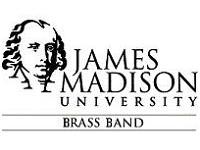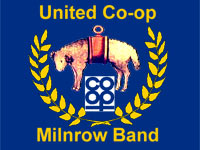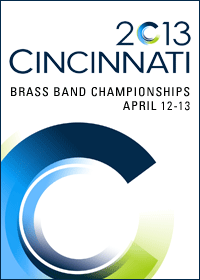Independance Day Concert
8-Jul-2008United Co-op Milnrow & James Madison University Bands
Conductors: John Ward & Kevin Stees
Leeds Central Corps of the SA
Friday 4th July
 The opportunity to hear a brass band from another country presented itself on 4th July at Leeds Central Salvation Army hall and attracted a good number in the audience. There was also significance in the date as the visiting band was from the USA, and 4th July is Independence Day.
The opportunity to hear a brass band from another country presented itself on 4th July at Leeds Central Salvation Army hall and attracted a good number in the audience. There was also significance in the date as the visiting band was from the USA, and 4th July is Independence Day.
Despite some effort earlier in the day to accommodate one of the bands on the platform in the hall, the available space proved to be insufficient. This resulted in the percussion section having free reign of the platform with the brass players forming up just in front and below it. This meant that the bands needed to interchange for their solo spots during the course of the evening, but this did not detract from what proved to be a varied and excellently presented programme.
God Bless America!
The concert opened with Milnrow taking their place and striking up with John Philip Sousa’s classic march “Stars and Stripes Forever”. The confident start filled the audience with anticipation of things to come. As the band approached the piccolo obligato section of the march (traditionally played by the Soprano Cornet), the JMU band’s tubas, euphoniums and baritones entered the hall and joined Milnrow to play it! It was a novel idea, played superbly, and drew prolonged applause from the audience.
At the end of the march, Milnrow vacated their seats to make way for the remainder of the JMU band. They joined their tuba, euphonium and baritone colleagues and took centre stage.
Sparkling
The audience was treated immediately to a sparkling start in JMU band’s first solo piece, James Curnow’s “Fanfare and Flourishes”. There was no doubt that, despite being young in years, this band were enthusiastic and enjoying their playing. The band displayed good control and the music came to a majestic end following a fine, balanced crescendo from the whole band.
Professor Kevin Stees took the applause and mentioned that the JMU band had been looking forward to their UK visit for some time. He explained that their remaining itinerary would see them perform another concert on Saturday 5th July, then compete in a march & hymn tune contest on Sunday 6th July before returning to the USA on Monday 7th July. They were certainly going to be kept busy.
Despite some occasional interference coming through the speakers, Professor Stees then introduced the JMU band’s next piece, “Born on the 4th July”. This music is the theme from the film of the same name, with music written by John Williams. It featured the band’s assistant principal cornet, Alex Bender, who’s confident playing of some very exposed solo passages, added to a very sensitive playing of the music from the whole band.
The Leeds Central Corps Bandmaster, Craig Buchan, provided some words of welcome and introduction to both bands. The JMU band are based in Harrisonburg, near Washington DC, a place close to Craig’s heart as was based close by when he worked for The Salvation Army in the USA.
Hometown
 JMU rounded off their first contribution with music written by Drew Fennel, a cornetist with River City Band in the USA. His composition “Hometown Miniatures” was written in four parts and presents some technical challenges to the players, which the band dealt with in a very accomplished fashion.
JMU rounded off their first contribution with music written by Drew Fennel, a cornetist with River City Band in the USA. His composition “Hometown Miniatures” was written in four parts and presents some technical challenges to the players, which the band dealt with in a very accomplished fashion.
Part 1 portrays an image of a US town, and focuses on the typical statue of a famous person somewhere in the centre. This was majestic music with a full sound shown by the tenor horns especially.
Part 2 serves as a reminder of craft fairs that often take place in the town, where the streets would be lined with stalls with people browsing through. The music was light and dainty in style, and this was conveyed by the band’s playing.
Part 3 depicts a neighbourhood scene, where people would often talk with each other across the street. It also makes reference to the citizens of the town attending the local church service. Passages of the music had lyrical lines being passed between players and the scoring was such that the church scene sounded like the church choir singing.
Part 4 (the finale) represents a celebration day in the town. It opens with an announcement of the celebration day through the cornet fanfare and moves quickly through to a well controlled, well balanced big finish. JMU took the applause from a delighted audience and made way for Milnrow Band to take their seats for their first solo contribution.
Whit Friday revisited
If anyone in the audience had shut their eyes they could have been forgiven for thinking they were at the Whit Friday marches (apart from the absence of wind and rain!) when Milnrow began their spot with Shipley Douglas’ classic march “Mephistopheles”. The band showed good control in their playing, with some fine ensemble work from the horns and baritones. It was also good to hear a Soprano Cornet sitting above the band with style and finesse. This was a fine rendition of a very popular march.
John Ward then introduced Alan Fernie’s arrangement of the Beatles classic “Eleanor Rigby”. After some pyrotechnics from the kit percussionist, the horns introduced the tune. There was a very rhythmic feel to this music. It flowed well and allowed the band to show its breadth of dynamics.
Sensitive
The audience was then introduced to the band’s Flugel Horn soloist, Joanne Ward, who chose to play the solo “A Time for Peace”. This is beautiful music from the pen of Peter Graham and is taken from his larger work “The Essence of Time”. There were times when the band was a little heavy and overpowered the soloist, but this did not detract from the very sensitive and accomplished playing from Joanne.
Milnrow Band’s final contribution in their first solo spot again featured film music, this time from the film “The Mask of Zorro”. This is music from James Horner, who also composed the music score for the film Titanic. The percussion section was kept very busy throughout this music, often using some of the minor percussion instruments (castanets, maracas). This was another driving piece with plenty of rhythm, and the band maintained good control throughout.
The final music presented just before the interval featured the JMU band, who returned to play James Curnow’s test piece “Trittico”. Dr Curnow wrote this with the art form Triptych in mind. The music uses the tune “Consolation” and develops this through three movements. The JMU band’s tubas had a more orchestral sound and it was also homogenous with the Euphoniums and Baritones, not really creating its own identity. The cornets also had more of a trumpet sound, but the band coped admirably with the prolonged sustained sections, showing good balance and control.
2nd half
Following the interval, JMU band introduced the second half with Paul Lovatt-Cooper’s “Where Eagles Sing”. This music was inspired by Paul’s visit to Florida where the American Eagle left such an impression that he penned the music. The technical demands, especially for Cornets and Euphoniums, were played with dexterity and confidence.
Professor Stees then introduced the JMU band’s final solo piece “Letter from Home” by Philip Sparke. This music was receiving only its 3rd performance in the UK and was written for the band. A very lyrical composition, the band’s soloist were featured during the playing. There were moments of tranquillity that came across well due to the band’s sensitive rendition.
Excellent work
Milnrow then returned to perform music from Kenneth Downie. His work “Grant us thy Peace” was published in The Salvation Army brass band journals, and is a very thoughtful and reflective piece. This was played with great sensitivity, with excellent work on display from the Soprano Cornet again.
John Ward then introduced Milnrow band’s major contribution for the evening, Steven Ponsford’s “Turris Fortissima”. This music was written for Enfield Citadel Band’s recent visit to the USA and uses as its base material the fact that the South Coast City of Plymouth was known as “strong tower”. This comes from the days of the two world wars, when Plymouth would frequently be one of the first points of attack on the UK mainland from the enemy. The music uses three tunes;
1. Blessed be the name of the Lord
2. My Jesus, My Saviour
3. Ein Feste Burg
The band’s full sound was again to the fore during the playing of this music, and brought the solo spot items to a marvellous conclusion.
All change please!
Major Peter Forrest, the minister at Leeds Central Corps of The Salvation Army, said that the proceeds from the evening’s event would go to a local project in Leeds, the Little London project, for which £500 was raised. He also brought a message from scripture.
For the last three items, both bands joined together initially under John Ward to present Wilfred Heaton’s arrangement of the hymn tune “Martyn”. This music held a poignancy as Wilfred Heaton was a soldier (church member) at Leeds Central Corps until he passed away. This was followed by a lively playing of Erik Leidzen’s march “Manhattan”.
The final music of the evening again featured film music. Professor Stees introduced the “Reunion and Finale” from the film Gettysburg. The film depicts the American Civil War and the music written by Randy Edelman is very emotive. The massed bands brought the evening to a fabulous conclusion with a stirring rendition of this music.
All in all this was a most enjoyable evening of music, presented by two bands that played very well. Special mention must be made of the enthusiasm of the players in the JMU band. It was clearly expressed in their faces, and something that isn’t in evidence too much these days.
A special word about Milnrow too, who, despite several recent player changes, made a tremendous contribution to the evening with some very high class music making.
Alun Perry




